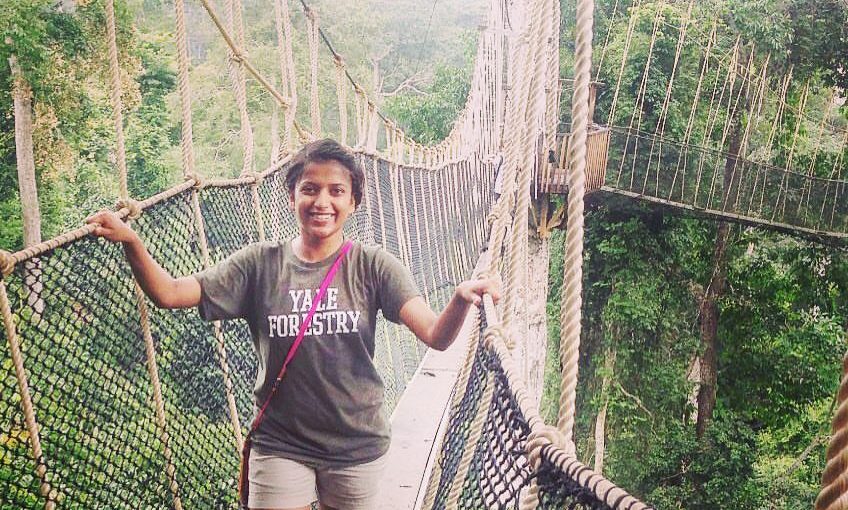Happy Environment day. Ironically, World Environment Day is right in the middle of one of the hottest weeks India has ever witnessed. God’s twisted way of smacking climate change and global warming on our face. For the past three days (temperature 45 degree C) my brand-new air-conditioner has been weeping non-stop, set at 27 degree C but the room is hardly 35 degree C.
Sometimes, I feel guilty about running an air-conditioner for the carbon emissions and the process heat it spews. The sad life of a global warming victim and perpetrator.
Last Friday, I attended a party in Gurgaon with a dozen of my friends, all with swanky incomes, all labelling me as their token friend who is an “environmentalist”. Next day, the Indian Meteorological Department issued heat wave warnings in six states with a population north of 300 million people. At 10 am, I woke up and gathered all my courage to pick up my necessary poison from the coffee shop round the corner. I walked 350 metres, wrapped in full sleeves, big headscarf, and black sunglasses, and still got a mini-heat stroke.
It struck me at that moment, how close the environmental crisis was to our lives, yet how distanced we presumed ourselves to be. Most people register these troubles of air, water, and heat; but continue their life as usual in a hugely misplaced bubble that it will not ever directly affect their own survival and sustenance.
I was transported back to the party, where a friend boasted of her jute bag and organic cotton T-shirts as “doing her bit for the environment”. I wondered what her life would look, 10 years from today, as she’d drop her kids to school in even hotter days with more severe heat waves wondering about the risk poised to her kids.
So, on this World Environment Day, I decided to step up and release a call for action, list down three steps you must consider to “do the right thing” for your own survival.
1. Acknowledge the severity of the crisis and work to solve it.
Without intending to scare you or depress you, I will state a few facts. About five major Indian cities are looking at zero water day in the next decade. Whether you live in a posh neighbourhood in Gurgaon or Bangalore, or cities like Lucknow or Mangalore, the likelihood that one fine day in the coming decade, your taps will run dry and you will have to queue up or order (if you are middle class) for private water tankers is very real. Churu, Rajasthan breached 50 degree C on June 2, 2019, and Delhi is not far behind simmering at 46.
The frequency and instances of such episodes are expected to multiply over the next decade. So, imagine 2030 and add blazing hot sun to your long water queue.
Normally by July, monsoon arrives in India cooling the hot parched lands accounting for almost 70 per cent of total rainfall in the region. But, it has been noticed that a combination of high concentration aerosol filled smog and extreme desertification mixed overall global climate change phenomenon has started to reshape the monsoon, estimating between 10 to 40 per cent decrease in rainfall.
Last but not least, don’t forget the arrival of the great Indian smog starting October where hazardous air quality starts to kill us and our loved ones with every breath of air.
But as you read through the last two paragraphs, check if your brain has started to shut down, and an internal voice just said: “Alright, we got this problem but what can I really do about it?” This presumed helplessness is the first and biggest challenge to solving environmental problems of our times.
If I could give one tip that would be to start acknowledging the problem and start imagining that you have solved it. Now walk backwards to different possible solutions and how, why, when, by whom can they work, and spread awareness and hope.
2. Measure your impact and drop that materialism
Count the plastic waste from that home delivered Swiggy meal that you order, the Epigamia cup of flavoured yoghurt, nutri bars, coffee stirrer, water sipper, soap wrapper, that makeup kit you just bought. Measure how much plastic did you buy this month, and how much you “needed” to. Chips, chocolates, water bottles, your favourite juice, and this list goes on. Ask yourself, did you really need it or you just wanted to emit some plastic.
Let’s move to your clothes and shoes. Do you know a single cotton t-shirt requires almost 2,500+ litres of water, and how many T-shirts in your wardrobe you haven’t touched for months?
Turn around your t-shirt and find that white care-instruction tag. It also reads “made with” typically noting nylon, acrylic, elastane, lycra—all polyester—all plastic. Yes, you my friend, are a living walking talking plastic factory, and you can stop all the horrors of those seagulls with plastic in their stomach, by simply keeping your plastic credit card in your pocket and not buying that t-shirt that you will wear exactly just once.
Next time, you are buying plastic in the form of food, water, shoes, clothes, makeup, cosmetics, remember you neither need those things nor do these things matter.
3. Use your skills and pick the environment as your full-time challenge
Jeff Hammerbacher, a Silicon Valley tech early employee at Facebook and now co-founder of data analytics startup Cloudera, quoted: “The best minds of my generation are thinking about how to make people click ads. That sucks.” I’d probably add on and say, “The best minds of my generation are misbelieving themselves to be too helpless and too poor and often engaging in jobs highly beneath them.”
Environmentalism is not going around planting trees, or taking pictures in front of plastic clean-up drives, and nor will it really solve any major problems. These are nice make-believe feel-good activities, but in the long run won’t move the needle.
Think of environmental crisis, like a broken inefficient incompetent system, and figure out where and how you can best fix it. You can be a writer, adman, data scientists, tech developer, financial analyst, research analyst, strategy consultant, program manager—you can be any of these fancy titles that we love so much and engage in fixing this broken system.
Maybe solving these problems won’t pay you as much as selling ads do, but then do you really need all that stuff you are buying with all this income?
Want to share your story of how you thrive? Write to us at [email protected]


